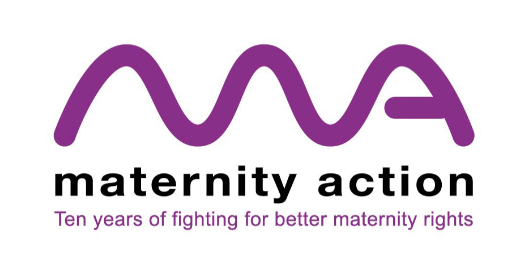 I attended a zoom meeting on the 25/11/20 hosted by Maternity Action (MA), which is the UK’s leading charity committed to ending inequality and improving the health and wellbeing of pregnant women, partners and young children – from conception through to the child’s early years. Part of their remit is the delivery of free, specialist advice through their telephone helplines, on employment rights, maternity pay and benefits. Maternity Action responds to 2,000 calls to their Maternity Rights Advice Line each year from women facing pregnancy discrimination at work or needing help understanding their employment rights. Shockingly, pregnant women or new mums experience high levels of discrimination and harassment, with circa 54,000 women losing their jobs each year as a direct result of pregnancy discrimination. One in 20 new mothers are made redundant during pregnancy, maternity leave or on their return to work.
I attended a zoom meeting on the 25/11/20 hosted by Maternity Action (MA), which is the UK’s leading charity committed to ending inequality and improving the health and wellbeing of pregnant women, partners and young children – from conception through to the child’s early years. Part of their remit is the delivery of free, specialist advice through their telephone helplines, on employment rights, maternity pay and benefits. Maternity Action responds to 2,000 calls to their Maternity Rights Advice Line each year from women facing pregnancy discrimination at work or needing help understanding their employment rights. Shockingly, pregnant women or new mums experience high levels of discrimination and harassment, with circa 54,000 women losing their jobs each year as a direct result of pregnancy discrimination. One in 20 new mothers are made redundant during pregnancy, maternity leave or on their return to work.
The purpose of zoom meeting was to launch their latest report: Insecure Labour: the realities of insecure work for pregnant women and new mothers. The charity worked closely with University and College Union (UCU) and UNISON in the production of the report. For both these unions the recent growth in insecure work has been a major issue for their members. They and MA have defined insecure work to include zero hours contracts, short term/fixed term contracts, short hours contracts, agency, casual and seasonal workers and low paid ‘self-employed contracts. From a higher education sector perspective, the use of fixed term contracts has increased in recent years and described by them as ‘endemic’.
Insecure contracts are prevalent in many female dominated sectors such as social care work, education and retail. Men are not exempt from insecure work, however, overwhelmingly, women workers are hugely impacted, due to the effect that pregnancy and maternity leave have on women’s job security and incomes and the unequal sharing of care and domestic labour in the home. The gender pay gap continues because of the impact on women of insecure work and associated low pay
This research report therefore explores the impact of insecure work on the rights of pregnant women and new mothers at work. Qualitative interviews were undertaken with ten pregnant and or new mothers who were in insecure work and their occupations ranged from a postgraduate research fellow, a teaching associate at a HEI, an advertising agency and another working for the NHS. Their lived experience of seeking to negotiate a safe working environment, a secure income and fair treatment is explored and reported on. The full report is available below: https://maternityaction.org.uk/research-insecure-labour/
One of the attendees on the MA zoom session was from the TUC and she brought our attention to a report they published in June this year: Pregnant and precarious: new and expectant mums’ experiences of work during Covid-19. In this report the TUC surveyed over 3,400 pregnant women and mums on maternity leave exploring their experiences of work during the pandemic.
In brief the survey highlighted the following points:
- One in four pregnant women and new mums experienced unfair treatment or discrimination at work including being singled out for redundancy or furlough.
- Pregnant women’s health and safety rights are being routinely disregarded, leaving women feeling unsafe at work or without pay when they are unable to attend their workplaces.
- Low-paid pregnant women are almost twice as likely as women on median to high incomes to have lost pay and or been forced to stop work (either by being required to take sick leave when they were not sick or to take unpaid leave, start their maternity leave early or leave the workplace altogether) because of unaddressed health and safety concerns.
- 71 per cent of new mums planning to return to work in the next three months are currently unable to find childcare to enable them to do so.
For the full report please click on the link: https://www.tuc.org.uk/sites/default/files/2020-06/PregMatCovid-19.pdf











 Dr. Ashraf cited on ‘Modest Fashion’ in The Guardian
Dr. Ashraf cited on ‘Modest Fashion’ in The Guardian NIHR-funded research launches website
NIHR-funded research launches website Academics write for newspaper in Nepal
Academics write for newspaper in Nepal New paper published on disability in women & girls
New paper published on disability in women & girls MSCA Postdoctoral Fellowships 2025 Call
MSCA Postdoctoral Fellowships 2025 Call ERC Advanced Grant 2025 Webinar
ERC Advanced Grant 2025 Webinar Horizon Europe Work Programme 2025 Published
Horizon Europe Work Programme 2025 Published Horizon Europe 2025 Work Programme pre-Published
Horizon Europe 2025 Work Programme pre-Published Update on UKRO services
Update on UKRO services European research project exploring use of ‘virtual twins’ to better manage metabolic associated fatty liver disease
European research project exploring use of ‘virtual twins’ to better manage metabolic associated fatty liver disease